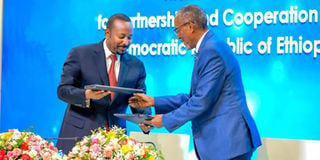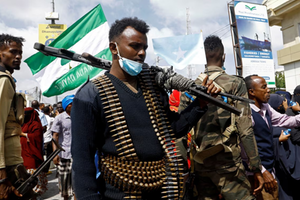
Somaliland President Muse Bihi and Ethiopia Prime Minister Abiy Ahmed
The January 1, 2024 port-for-recognition Memorandum of Understanding (MoU) between Ethiopia and the breakaway Somaliland region of Somalia cast a long shadow over the presidential election held on November 13, 2024.
The deal—which stated that Somaliland would lease 19 kilometres of Somalia’s Gulf of Aden coastline to Ethiopia—was a re-election strategy by President Muse Bihi Abdi who was seeking a second term on the ticket of the ruling Kulmiye Party. Its aim was to get Ethiopia, a host of the African Union, to open the floodgates of global recognition of Somaliland as a sovereign nation—a top priority for over one million Somalilanders registered to vote in the fourth election since the territory broke away from Somalia in 1991.
The strategy has not worked. Instead, it has fuelled tensions across the Horn region and beyond. This article examines the winners and losers in Somaliland’s 2024 elections, which pitted the incumbent against the opposition candidates Abdirahman (“Irro”) Mohamed Abdullahi of the Waddani party and a third way candidate, Faysal Ali Warabe of the UCID Party.
The final results of the election are expected on November 21. But the opposition has emerged as the clear winner. Ahead of the polls Abdirahman (“Irro”) created a big tent strategy around his Waddani Party which won the support of women, young people and the powerful lobby, the Alliance for Equity and Development (KAAH).
Incumbent President Abdi
The real loser in the election is the incumbent President Abdi. His controversial port-for-recognition strategy has not delivered victory. It has also not led to Somaliland’s international recognition. Arguably, President Abdi’s loss can be traced to the aftershocks of his humiliating military defeat in Los Anod in the battle of Goojacade. The civil war that reached a dangerous peak in the February-August 2023 hiatus was a deadly clash between the Somaliland military and Darod (Dhulbahante) clan fighters, who supported reunification with Somalia. The conflict killed over 300 people and displaced 153,000–203,000 others as refugees. Somaliland’s democracy also lost the shine and effectiveness as a secessionist strategy. For three decades, Somaliland has used its stable democracy as a trump card to win recognition as an independent nation. Trouble started when conflict in the Eastern parts of Somaliland forced Bihi to postpone the elections originally slated for November 14, 2022. The war and mass displacement badly tarnished Somaliland’s image as a stable political entity and weakened its bid for international recognition. The conflict made it impossible for the Darood and Dir in the region to vote, making the November polls an Isaaq affair. Abdirahman ‘Irro’s now faces a Herculean task to bring marginalised groups and minority clans into a broad-based government.
At the national level, the ultimate winner is the Federal Government of Somalia (FGS). The conflict in Las Anod suggested that Mogadishu was increasingly making national unity attractive to sections of Somalilanders. It has since recognised the SSC-Khatumo region of Somaliland as an interim administration of the Federal Government.
With Bihi’s exit, the Somalia-Somaliland reunification agenda might be on the table again, although not immediately. But Barre-era old-guards who still hold sway in Hargeisa will resist reunification with Somalia.
Even then, three decades after Siad Barre left, Somaliland’s secessionists are quickly losing the argument they should be recognised as an independent nation merely because they were brutalised by Barre. Other Somali clans were not only brutalised, but have faced three decades of civil war and terrorism. Somaliland’s opposition may abandon Bihi’s port-for-recognition strategy, but they will continue to push for the recognition of Somaliland.
However, although Somaliland’s democracy is losing its shine and the world is supporting the “one Somalia” policy, Mogadishu has the heavy lifting to do to make reunification attractive to Somalilanders. Blissfully, Irro is a man Mogadishu can do business with directly or through proxies. Long before the November elections, he has started opening up avenues of communication with Djibouti, influential Kenyan Somalis and Villa Somalia. According to one Somalilander intellectual colleague, Somalia should consider establishing a new neutral Capital along the lines of Abuja in post-civil war Nigeria. It should also midwife an innovative political system acceptable to all Somali regions and clans. Dismantling the 4.5 clan-based electoral system and replacing it with the one-man-one-vote is not enough. Perhaps Somalia needs a two tier electoral system: a popular vote and skillful transformation of its 4.5 clan-based electoral system into an American-style ‘Electoral College’ of clans to ally the fear of regions and clans.
Ethiopia-Somalia crisis
Regionally, Djibouti, which has close ties with Somaliland’s newly elected leadership, is a big winner. Together with Kenya and Turkey, Djibouti has invested in resolving the Ethiopia-Somalia crisis. But having given Ethiopia an unhindered access to the port of Djibouti, Djiboutians are not happy with the port-for-recognition deal between Ethiopia and Somaliland. In late August, Djiboutian Foreign Minister Mahmoud Ali Youssouf announced his country’s proposal for a joint management deal for the port of Tadjoura to Ethiopia. Perhaps after the elections, Ethiopia might consider taking the offer.
By all measures, Ethiopia is the greatest loser in the Somaliland elections. After Bihi’s defeat, the port deal is, to all intents and purposes, dead in the water. From privileged conversations, it is clear that Prime Minister Abiy Ahmed needed to giving Bihi’s port-for-recognition MoU strategy a chance and wait for the election to end before abandoning the pact. There are carrots and sticks galore. Somalia’s national security adviser, Hussein Sheikh Ali, has insisted that Ethiopia should withdraw from the MoU or pull all its troops from Somali soil. Failure to that, Somalia is determined to bar Ethiopian troops from joining the new AU Support and Stabilisation Mission (AUSSOM) in January 2025.
Notably, Egypt, Eritrea and Somalia have formed a tripartite coalition to prevent Ethiopia’s military ambitions in the Red Sea Coastline. Egypt has joined the AUSSOM, stoking fears in Addis Ababa and Hargeisa of the impact of its arms and troops in regional security.
Globally, the Somaliland election is likely to escalate great power competition. President Biden had plans to establish a permanent military base at the port of Berbera in Somaliland and to use Somaliland’s connection with Taiwan to contain China. It is not clear whether President Trump will continue with these policies or heed to voices urging him “to stand with Somaliland's democratic values and stability in the region.” On its part, international recognition of Somaliland, which has diplomatic ties with Taiwan, is China’s worst nightmare on its Horn diplomacy.
Prof Kagwanja is the Chief Executive at the Africa Policy Institute and a former government adviser.







